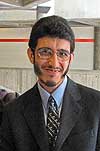| Pages in topic: [1 2] > | Farsi/Dari/Tajik(i): A Trio to Deal with Thread poster: Behnam Koleili
|
|---|
Behnam Koleili 
Iran
Local time: 22:55
Member (2004)
English to Persian (Farsi)
+ ...
Dear All,
Native speakers of these languages (or rather variants of Persian language) know that these languages are too close. But this is probably not known to many speakers of other languages.
The Persian language is locally known as
* فارسی (transliteration: Fārsi) or پارسی (Pārsi), local name in Iran, Afghanistan (where it is officially known as Darī) and Tajikistan,
* Tajik, local name in Central Asia.
* Dari, name given ... See more Dear All,
Native speakers of these languages (or rather variants of Persian language) know that these languages are too close. But this is probably not known to many speakers of other languages.
The Persian language is locally known as
* فارسی (transliteration: Fārsi) or پارسی (Pārsi), local name in Iran, Afghanistan (where it is officially known as Darī) and Tajikistan,
* Tajik, local name in Central Asia.
* Dari, name given to classical Persian poetry and court language, as well as to Persian dialects spoken in Afghanistan, Tajikistan.
Lexical confusion in the West between terms like Farsi, Dari and Tajiki often leads to an underestimation of the breadth of the influence of Persian in Southwest Asia, which is quite important and is a legacy of the millennia-long existence of a Persian cultural sphere, perhaps because this cultural sphere functioned differently than modern nationalism in the West.
http://en.wikipedia.org/wiki/Persian_language
Definitely Persian is a widely spoken language with a glorious background and deserves more attention.
Please share your points of views.
Warm regards,
Behnam ▲ Collapse
| | | | Fabio Descalzi 
Uruguay
Local time: 16:25
Member (2004)
German to Spanish
+ ...
| Need for coordination ? | Oct 17, 2007 |
Hi people
This is a very interesting issue.
It has to do with the new geopolitical reality in Asia - and with international relationships (political, cultural, economic, social, family...) among the people at least three countries: Iran, Afghanistan and Tajikistan (maybe Pakistan and other countries too, as well as the worldwide diaspora of speakers).
There are some other related threads on the matter, but please d... See more Hi people
This is a very interesting issue.
It has to do with the new geopolitical reality in Asia - and with international relationships (political, cultural, economic, social, family...) among the people at least three countries: Iran, Afghanistan and Tajikistan (maybe Pakistan and other countries too, as well as the worldwide diaspora of speakers).
There are some other related threads on the matter, but please don't get confused:
http://www.proz.com/topic/85921 - "Persian" or "Farsi" in Proz (a thread in Persian; as you see, it's about how to name Persian itself)
http://www.proz.com/topic/85939 - about Persian script at ProZ
http://www.proz.com/topic/85267 - Central Asian languages - Tajik is one of them, but that thread deals mainly with Turkic-related languages (and the influence of Persian and other languages on them)
So, let's try to get right to the issue here.
As Behnam rightly puts it, Persian has at least three "local" names: Farsi, Dari, Tajik.
Something similar, maybe, to Brazilian Portuguese and European Portuguese...
Or (I am a Spanish native speaker): "español" and "castellano".
Or Romanian and Moldavian; etc.
There are historical ties and barriers in every case. Tajik is currently written in Cyrillic alphabet, unlike Farsi and Dari. And it is easy to imagine that there are thousands of Russian loan words in it.
If we think about the trio of the topic, we could maybe think about "Big-Persian" or "Pan-Persian", if we plainly compare with "Spanish" or "Portuguese" (and understand me: I am not trying to invent a name, but a concept).
So, here comes the question contained in the title of my post: a language in need for, say, a common regulatory body...?
[Edited at 2007-10-17 10:52] ▲ Collapse
| | | | | The eternal chestnut - language or dialect? | Oct 17, 2007 |
The languages and dialects under the heading of Persian/Farsi seem to be immensely rich and complex. Looking at Wiki and Ethnologue, it seems that there are dozens of variants within this language group, and that in some cases the differences are so great that the variants need to be considered as languages rather than dialects. And as so often, the linguistic boundaries do not correspond to the national boundaries, and the assessment of what is a dialect and what is a language is often inextric... See more The languages and dialects under the heading of Persian/Farsi seem to be immensely rich and complex. Looking at Wiki and Ethnologue, it seems that there are dozens of variants within this language group, and that in some cases the differences are so great that the variants need to be considered as languages rather than dialects. And as so often, the linguistic boundaries do not correspond to the national boundaries, and the assessment of what is a dialect and what is a language is often inextricably bound up with questions of political opinion and ethnic identity.
From an information point of view, I would find it valuable for Behnam and others from the language group to explain their own language background and how they perceive the links between their own languages and the other languages/dialects in the region. I expect that this would provide a very complex tapestry of fact and opinion, and that the perceptions of the situation would differ and possibly even conflict in places. I do not see this as a problem - I am fascinated by linguistic diversity, and I believe that everyone should be free to express their own linguistic identity.
I do not see this leading to any change in the language names used on Proz.com, at least not in the short term. But it would be interesting to learn what languages of the Persian/Farsi family of languages are actually used/spoken/translated by people on this site. For example, how dominant is the literary language (which seems to be consistently recognised in Iran and Afghanistan)? To what extent are there distinguishable differences in the national variants which are apparent in documents such as national laws, government statements etc.? Are the smaller regional dialects/languages used at all in any translation work done by members of Proz.com?
As to a regulatory body spanning all countries, I tend to be sceptical. It seems that there is a de facto literary variant of the language which is used beyond national borders, but otherwise there is a range of languages/dialects used in everyday life which cannot realistically be regulated.
I wonder if anyone can comment on whether the differences between the language variants are greater/less than the differences between Slavic or Scandinavian languages? But perhaps this is too much to ask, because it would require in-depth local knowledge of linguistic diversity in areas that are very far apart. ▲ Collapse
| | | | Tim Drayton 
Cyprus
Local time: 22:25
Turkish to English
+ ...
| How close are Kurdish and Farsi? | Oct 17, 2007 |
On a related issue, I wonder how closely Kurdish and Farsi are related. I believe they both belong to the same language group. Can speakers of one language understand a little of the other?
| | |
|
|
|
Tim Drayton wrote:
On a related issue, I wonder how closely Kurdish and Farsi are related. I believe they both belong to the same language group. Can speakers of one language understand a little of the other?
Within the group, the are split up between Northwestern and Southwestern Iranian:
http://www.ethnologue.com/show_family.asp?subid=90020
Based on what I've heard, I don't think they understand much of eachothers spoken language, but I could be wrong...
Another question: for those of you who translate from/into written farsi/dari, could you say that you're able to take on either variety, or does it require a specialist in either language to get it right?
(I guess tajiki is a different ballgame because it would require learning the cyrillic alphabet first).
/Jan
| | | | Atena Hensch 
New Zealand
Local time: 07:25
Persian (Farsi) to English
+ ...
| Kurdish language | Oct 17, 2007 |
Tim Drayton wrote:
On a related issue, I wonder how closely Kurdish and Farsi are related. I believe they both belong to the same language group. Can speakers of one language understand a little of the other?
Maybe 5 out of 100, I would say. they are very similar but it's not easy to understand.
My father was Kurd, but I hardly could understand anything that he was talking to his family.
cheers
Atena
| | | | Atena Hensch 
New Zealand
Local time: 07:25
Persian (Farsi) to English
+ ...
| Farsi or Persian | Oct 18, 2007 |
Hi
I kept thinking about this forum the whole afternoon and I understand what Behnam means. There are few things to consider:
1) there are so many people out who don't know Farsi and Persian are the same language and when they try to find a freelancer they look for either Farsi or Persian directory. I don't think it is wise to change the language names. We want the outsources or others to find us not anything else.
2) Dari is a dialect of the Farsi language but it... See more Hi
I kept thinking about this forum the whole afternoon and I understand what Behnam means. There are few things to consider:
1) there are so many people out who don't know Farsi and Persian are the same language and when they try to find a freelancer they look for either Farsi or Persian directory. I don't think it is wise to change the language names. We want the outsources or others to find us not anything else.
2) Dari is a dialect of the Farsi language but it doesn't mean an Iranian Farsi/Persian speaker can totally understand an Afghan person. I am personally, learning Dari, even though Farsi / Persian is my mother tongue. There are so many words in the Dari dialect which we don't have in Farsi / Persian, or sometimes the same words have another meaning in Farsi. For example: "Motor" means engine in Farsi but in Dari it means a car. An Afghan person would never use "Sandali" for the word "chair" and it doesn't exist in Afghanistan and if you say the word "chooki" to an Iranian person they could never understand that this is a word for chair.
3)We may need to look at why so many words are different:
A) the language of Farsi / Persian in Iran was exposed to western languages more than Dari, while Afghanistan was much more secluded from the rest of the world. So, the development of the language happened in a different way.
B) Dari uses more old Farsi / Persian which is archaic for an Iranian person.
4)Tajik language uses the cyrillic script and Tadjikistan has been more influenced by Russian that Iran.
Persia and Persian were the names known by people before Arab conquered Persia. After that, Arab people couldn't pronounce the word persian and Parsi (simply because the letter P is not exist in Arabic) so, they called the language Farsi instead of Parsi.
cheers
Atena ▲ Collapse
| | | | Parrot 
Spain
Local time: 21:25
Spanish to English
+ ...
| I think many of us are in agreement on this point | Oct 18, 2007 |
Atena Hensch wrote:
Persia and Persian were the names known by people before Arab conquered Persia. After that, Arab people couldn't pronounce the word persian and Parsi (simply because the letter P is not exist in Arabic) so, they called the language Farsi instead of Parsi.
The pending issue is probably more, how to come to terms with variants. Any suggestions would be welcome.
| | |
|
|
|
Fabio Descalzi 
Uruguay
Local time: 16:25
Member (2004)
German to Spanish
+ ...
| It's about the "Persian trio" | Oct 18, 2007 |
Thanks Athena for your most welcome views. And very interesting to know that your father was a speaker of Kurdish.
Atena Hensch wrote:
1) there are so many people out who don't know Farsi and Persian are the same language and when they try to find a freelancer they look for either Farsi or Persian directory. I don't think it is wise to change the language names. We want the outsources or others to find us not anything else.
(...)
Persia and Persian were the names known by people before Arab conquered Persia. After that, Arab people couldn't pronounce the word persian and Parsi (simply because the letter P is not exist in Arabic) so, they called the language Farsi instead of Parsi.
For the issue of the name Persian/Farsi, please go to the corresponding thread: http://www.proz.com/topic/85921 - this thread is NOT about the name of the main language spoken in Iran.
And one short comment regarding names. Although I prefer to talk about "Persian", for practical reasons in this very thread I will tend to talk about "Farsi proper" to refer to the official language of Iran, and thus help differentiate from the other languages of the "Persian trio", Dari and Tajik. Please, forgive me for this...
Atena Hensch wrote:
2) Dari is a dialect of the Farsi language but it doesn't mean an Iranian Farsi/Persian speaker can totally understand an Afghan person. I am personally, learning Dari, even though Farsi / Persian is my mother tongue. There are so many words in the Dari dialect which we don't have in Farsi / Persian, or sometimes the same words have another meaning in Farsi. For example: "Motor" means engine in Farsi but in Dari it means a car. An Afghan person would never use "Sandali" for the word "chair" and it doesn't exist in Afghanistan and if you say the word "chooki" to an Iranian person they could never understand that this is a word for chair.
3)We may need to look at why so many words are different:
A) the language of Farsi / Persian in Iran was exposed to western languages more than Dari, while Afghanistan was much more secluded from the rest of the world. So, the development of the language happened in a different way.
B) Dari uses more old Farsi / Persian which is archaic for an Iranian person.
4)Tajik language uses the cyrillic script and Tadjikistan has been more influenced by Russian that Iran.
That is the topic here. The "Persian trio": Farsi proper, Dari, Tajik, and how they can go on together. As Parrot rightly puts it: how to come to terms with variants.
Right now, searching the web, I found an announcement from a University, concerning this group of languages. It even differentiates between Eastern and Western Farsi. It refers to the "Persian trio" as Less Commonly Taught Languages - I assume this denomination "Less Commonly Taught" has to do with languages "other than Farsi proper".
Frankly speaking: a layman may tend to think that "Afghans speak Pashto" (ignoring the important reality of Dari, spoken by about half the people in Afghanistan) and "Tajik is a language somewhere in Central Asia".
The purpose of this thread is:Let's help put them closer together! I don't mean to "confuse" each other, or to "mix" them up. But please, let's concentrate on this "Persian trio".
| | | | | Farsi vs. Dari | Oct 19, 2007 |
This is very interested topic, as we are often asked by the clients, what is the difference between farsi/Persian and Dari? and that is not always an easy task.
Farsi is spoken in Iran, Dari in Afghanistan and Tajik in Tajuikstan. I do not know about Tajiki that much, as it is written in Russian alphabets. but Dari and Farsi:
Atena Hensch wrote:
2) Dari is a dialect of the Farsi language but it doesn't mean an Iranian Farsi/Persian speaker can totally understand an Afghan person. I am personally, learning Dari, even though Farsi / Persian is my mother tongue. There are so many words in the Dari dialect which we don't have in Farsi / Persian, or sometimes the same words have another meaning in Farsi. For example: "Motor" means engine in Farsi but in Dari it means a car. An Afghan person would never use "Sandali" for the word "chair" and it doesn't exist in Afghanistan and if you say the word "chooki" to an Iranian person they could never understand that this is a word for chair.
3)We may need to look at why so many words are different:
A) the language of Farsi / Persian in Iran was exposed to western languages more than Dari, while Afghanistan was much more secluded from the rest of the world. So, the development of the language happened in a different way.
B) Dari uses more old Farsi / Persian which is archaic for an Iranian person.
as Atena has put it, there are so many Farsi words, that could not be understood by Dari native, as well as Dari has its own words that is not understood by native Farsi speaker. I will add that lt gets much more diffecult, when you have to listen and understand the other dialect speaker.
Recently, a dictionary of Farsi to Dari/Dari to Farsi was published for the first time, with thousands words, shows the greater difference between those two languages.
The fact that over 50 percent of Afghanistan's people (where Dari is being spoken) are Pashto language speaker, has created a common terminology in Afghanistan, where almost of it is taken from Pashto language. So, when a Farsi native is asked for translation of official documents, they face so many words that could not be found in any Farsi dictionary.
Also, Farsi native of Iran adopts foriegn words only from French language, whereas in Afghanistan, they have borrowed from so many foriegn languages. Also, in Iran they tend to translate almost every foriegn word, but in Afghanistan, often they translitrate it.
Many times i have asked by clients to revise/change a translated document from Farsi to Dari, because the end user has rejected the word as not being Dari.
| | | | Atena Hensch 
New Zealand
Local time: 07:25
Persian (Farsi) to English
+ ...
Subhan Fakhrizada wrote:
Recently, a dictionary of Farsi to Dari/Dari to Farsi was published for the first time, with thousands words, shows the greater difference between those two languages.
The fact that over 50 percent of Afghanistan's people (where Dari is being spoken) are Pashto language speaker, has created a common terminology in Afghanistan, where almost of it is taken from Pashto language. So, when a Farsi native is asked for translation of official documents, they face so many words that could not be found in any Farsi dictionary.
Also, Farsi native of Iran adopts foriegn words only from French language, whereas in Afghanistan, they have borrowed from so many foriegn languages. Also, in Iran they tend to translate almost every foriegn word, but in Afghanistan, often they translitrate it.
Many times i have asked by clients to revise/change a translated document from Farsi to Dari, because the end user has rejected the word as not being Dari.
I agree with Subhan.
Subhan, could you please tell me the name of this new dictionary? I'd love to buy it.
cheers
Atena
| | | | | Here are the details | Oct 21, 2007 |
Atena Hensch wrote:
Subhan, could you please tell me the name of this new dictionary? I'd love to buy it.
Atena
the detials are as follow:
نام کتاب: فرهنگ فارسی ـ دری، دری ـ فارسی
نویسنده (گردآورنده): ورژخاچاطوری پارسادانیان (استاد دانشگاه هراچیا آچاریان ارمنستان)
ناشر: نشر فرهنگ معاصر
محل چاپ: تهران
شمار صفحه ها: ۱۷۶ صفحه
Regards,
Subhan
[Subject edited by staff or moderator 2007-10-29 13:01]
| | |
|
|
|
Sabaa
Persian (Farsi) to English
| Dari & Farsi | Feb 21, 2008 |
One thing not mentioned here is the fact that Dari and Farsi used to be terms referring to same language in conjunction or interchangeably. Afghani poets, like Rumi & Naser Khesrow, as well as Iranian ones, including Hafez & Sa'di, have used both "Dari" and "Farsi" when speaking of their language. This notion that Dari and Farsi are two different languages has developed only recently, for the past 50 years or so. As an Afghan I may not understand everything an Iranian says, due to pronunciation ... See more One thing not mentioned here is the fact that Dari and Farsi used to be terms referring to same language in conjunction or interchangeably. Afghani poets, like Rumi & Naser Khesrow, as well as Iranian ones, including Hafez & Sa'di, have used both "Dari" and "Farsi" when speaking of their language. This notion that Dari and Farsi are two different languages has developed only recently, for the past 50 years or so. As an Afghan I may not understand everything an Iranian says, due to pronunciation differences and some vocab, but I fully comprehend an article written by one; vice versa.
-ci'ao. orr..I should say, khoda hafez! ▲ Collapse
| | | | Ramin Vali 
Local time: 07:25
Persian (Farsi) to English
+ ...
It very nice to see this highly informative topic
Using Fabio’s terminology….
About Farsi, Dari and Tajik,
I agree in general with Atena and Subhan.
I think it is a bit (about 400 to 500 years) late to start having a governing body to regulate between Farsi proper, Dari and Tajik. These three, although most certainly come from the same root (the whole pan Persian concept), are now going their separate ways. However, I for one would v... See more It very nice to see this highly informative topic
Using Fabio’s terminology….
About Farsi, Dari and Tajik,
I agree in general with Atena and Subhan.
I think it is a bit (about 400 to 500 years) late to start having a governing body to regulate between Farsi proper, Dari and Tajik. These three, although most certainly come from the same root (the whole pan Persian concept), are now going their separate ways. However, I for one would very much enjoy knowing that if I go back some centuries and read poetry from say Khayam or Molana or Nasser Khosro, Afghan and Tajik people can understand it and although we might have difficulty talking to each other for not knowing some of the words, we still have the same appreciation for the literature that poets of old have left for us.
One also gets a nice feeling when one is speaking to a Zoroastrian in Iran. These people try not to use many Arabic imports (which are now a part of what Fabio calls Farsi proper). What happens is that they use many of the older Persian terms that we Iranians sometimes don’t use for day to day conversation. Farsi today has been influenced by Arabic but that is in the vocabulary, the grammar is totally different.
How to come to terms with variants,
Learn all of them and keep updating yourself! That’s the only way to do all three of them justice. Aside from translation, day to day usage of these three is affected by slang and minute changes that can only be mastered if one masters the language completely.
I have had court assignments for some people who spoke Dari and I refused because I did not think it was fair for the person to have a Farsi speaking interpreter (without proper Dari training). But a Dari speaker at the dinner table is another matter; we can get on very well. I hope I could get my point across.
About Kurdish, and others.
My father had to learn Kurdish when he was posted to the Kurdestan province. It actually is a separate language, It has its own grammar which constitutes it as a language, it is not a dialect of anything, though some of the words are related to old Persian.
If one travels in Iran one might hear dialects of the language that might be mistaken with a totally different language, such as Gilaki (attached to Gilan province north of Iran).
I hope this answers more questions than it generates.
Khodahafez
Or
Bedrood
Or
Eydoon Bad ▲ Collapse
| | | | Fabio Descalzi 
Uruguay
Local time: 16:25
Member (2004)
German to Spanish
+ ...
| Let's take Kurdish seriously :) | Apr 26, 2008 |
Atena Hensch wrote: Tim Drayton wrote:
On a related issue, I wonder how closely Kurdish and Farsi are related. I believe they both belong to the same language group. Can speakers of one language understand a little of the other? Maybe 5 out of 100, I would say. they are very similar but it's not easy to understand. My father was Kurd, but I hardly could understand anything that he was talking to his family.
Hi people,
Don't miss the forum for the Kurdish language: http://www.proz.com/forum/466
CheerZ,
Fabio
| | | | | Pages in topic: [1 2] > | To report site rules violations or get help, contact a site moderator: You can also contact site staff by submitting a support request » Farsi/Dari/Tajik(i): A Trio to Deal with | TM-Town | Manage your TMs and Terms ... and boost your translation business
Are you ready for something fresh in the industry? TM-Town is a unique new site for you -- the freelance translator -- to store, manage and share translation memories (TMs) and glossaries...and potentially meet new clients on the basis of your prior work.
More info » |
| | Trados Business Manager Lite | Create customer quotes and invoices from within Trados Studio
Trados Business Manager Lite helps to simplify and speed up some of the daily tasks, such as invoicing and reporting, associated with running your freelance translation business.
More info » |
|
| | | | X Sign in to your ProZ.com account... | | | | | |













